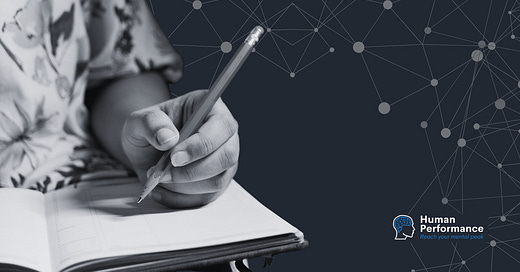Why Handwriting Is Essential for Memory, Learning, Creativity & Personal Growth
This week on the Wednesday article, I explore why in the age of AI, handwriting is still relevant and important for cognitive development.
This is the Wednesday Article, going out to your inbox, as the name suggests, every Wednesday. It’s for paying subscribers and digs into the psychology of peak human performance. Whether you are a business leader, sportsperson, writer, artist, surgeon, politician or otherwise, the Wednesday Article aims to bring you learnings from psychology to help you do your best work. Links and references to all sources are provided for further reading. Upgrade or subscribe here to get it.
We're at the tail end of 2024, and as yet another year passes, and the realisation of my looming yet inevitable annihilation invades my mind–I'm getting older after all, as my dear father keeps reminding me–I wonder what I might have achieved this past twelve months but did not.
Truthfully, it doesn’t matter because the time I had, if it ever existed, is gone, never to be relived. All that remains is merely a thought that it did, and I perhaps wasted it. I might be hastened to add that, at least, I have the future. But on closer examination, I can see that this idea is also merely a figment of my imagination. I can never experience the future because when it arrives (for want of a better word. It doesn’t come from somewhere else, after all), it is still now. The moment we occupy appears to be the only reality, so what we do now seems to me, at least, to be most important. And so, the physical act of writing with a pen and paper has the effect of anchoring us in this reality. I write by hand often, and I recommend it to my coaching and counselling clients as a tool for reorienting thoughts, feelings, and behaviours. It’s a way of processing the day, noticing and reinforcing what’s going well in our lives.
As technology goes, handwriting is perhaps one of the earliest human inventions occurring in its many forms in various cultures over time. In this digital age, however, handwriting has arguably become a rare skill1. The convenience and speed of keyboards and touchscreens have largely replaced the laborious task of writing with pen and paper. Yet, scientific research continues to uncover significant cognitive advantages of handwriting over typing with a keyboard. From enhancing memory and comprehension to fostering creativity and deeper learning, the physical act of writing engages the brain in ways that typing simply cannot replicate. And not only in the practical sense of getting things done but also in self-reflection, processing personal challenges, and designing the future we desire for ourselves and others.
Keep reading with a 7-day free trial
Subscribe to Peak Performer to keep reading this post and get 7 days of free access to the full post archives.




